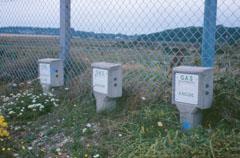Teachers need advice on careers too, Be on the lookout for signs of gas anodes and Applied science potential post-16
Teachers need advice on careers too

I enjoyed the interesting Endpoint article on the employment opportunities that a degree in chemistry offers today's students (see Educ. Chem., 2006, 43 (6), 176). The data presented reinforced what I assumed happens in the outside world. I say this because inevitably we secondary teachers, especially those of us in the majority, ie the wrong side of 40 and who have not been involved in industry for years, have no knowledge of what is really happening in the commercial world.
So please, in your plans for the Chemistry for our future (CFOF) programme include some INSET time for us A-level teachers to be made aware of what is going on out there in industry because at the end of the day we are the interface with students and unless we know what's what then a lot of very laudable efforts will be wasted. Remember too that schools and colleges often have very definite targets to do specifically with teaching and learning. These dictate what INSET schools and colleges will allow their staff out on and so INSET courses will have to be tailored carefully in terms of such teaching and learning criteria
Alan James,
Queensbury School, Bedfordshire
In response
Josephine Tunney, national programme manager for CFOF at the RSC comments:
Unfortunately, the CFOF funding can't be used for INSET programmes. The funding is coming from the Higher Education Funding Council for England (HEFCE) and INSET is outside their remit. However, the Royal Society of Chemistry (RSC) will be using some of the funding to organise conferences for teachers and careers advisers to raise awareness of careers opportunities within science.
The RSC will also be developing new careers resources, including DVDs which will feature chemists at work in industry. Free copies of these resources will be sent to all schools and colleges in England, which teachers should find useful as well as students.
In addition, the RSC will use some of the funding to extend the number of Chemistry at Work events which take place in England. The CFOF team will also be working with the Nuffield Foundation to raise awareness of its science bursary scheme - this year the Nuffield Foundation is offering funding for up to 1000 post-16 students to take up science-based R&D placements during summer 2007.
Be on the lookout for signs of gas anodes

Unfortunately, because of space restrictions on the page, it wasn't possible to include this picture of gas anode markers (below) as part of November's Chemistry trail on gas anodes, coatings and corrosion protection (Educ. Chem., 2006, 43 (6), 149). So if you were wondering how to spot a gas anode, this shows you. Unfortunately, the sign on Lepe Beach has now been removed. Does anyone know where to see a similar sign?
Peter Borrows, Amersham Old Town
Applied science potential post-16
In his informative article on the role of the applied science option in the 14-16 curriculum (see Educ. Chem., 2007, 43 (6), 168) Ken Gadd does not address the question, 'How well does the applied science course equip pupils for sixthform chemistry, contrasted with other alternatives on offer at GCSE level?'. Perhaps this is not one of the course's objectives, or perhaps it has other objectives which are viewed as more important.
Alan Dronsfield, Derby
In response
Ken Gadd, 4science, Salisbury, comments:
The answer is not straightforward. All GCSE science specifications changed in 2006. There will be new GCE science specifications in 2008. GCE applied science specifications are due two years later. So, as ever, the assessment landscape continues to change.
The Qualifications and Curriculum Authority (QCA) states that 'AS- and A-level science specifications must build on the skills, knowledge and understanding set out in the GCSE criteria for science'. All 2006 applied science options at KS4 meet these criteria. GCSE Applied Science (double award) and BTEC First Certificate and Diploma specifications allow teachers to design courses to meet their students' progression aims. For example, double award applied science specifications have sections on chemical analysis and making chemicals. Teachers can link these to chemical ideas in the externally assessed unit. Done well, the result is courses that do equip students to progress to advanced level study in chemistry. Careful scrutiny of the specifications will make clear the opportunities.
Space does not allow me to go into detail with the examples, but I would encourage people who are interested to look at some of the support materials mentioned in my article. OCR GCSE Additional Applied Science allows students to choose two modules from a bank of six. The two modules Scientific detection and Harnessing chemicals provide plenty of chemistry.
At a recent conference on applied science courses held at the national Science Learning Centre, York, Ian Richardson, HMI specialist adviser for science, stressed the importance of engaging students. He warmly endorsed the effectiveness of applied science courses to do this. And engagement is important to progression.



No comments yet